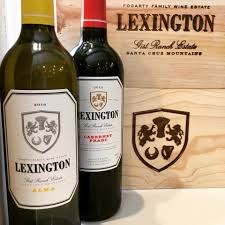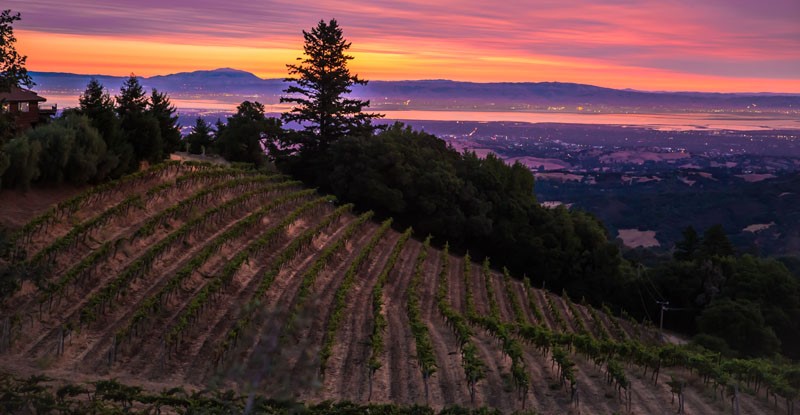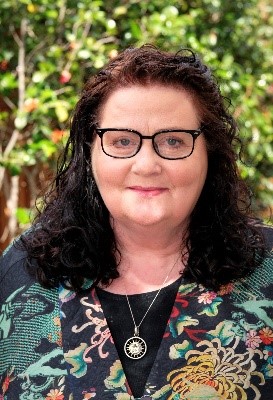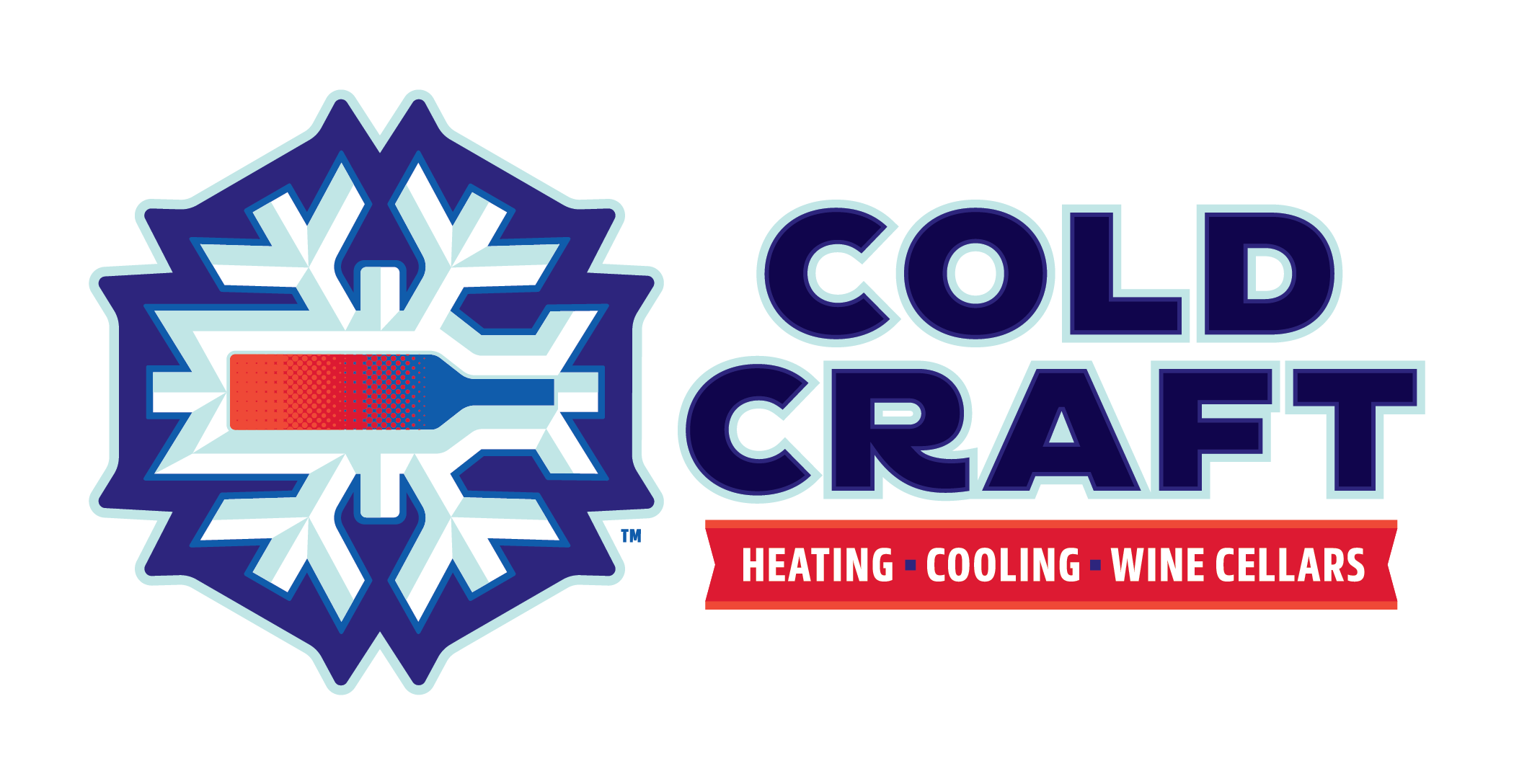By Susan King CS, FWS
 Several years ago, you doubled down on farming in the Santa Cruz Mountains and purchased Gist Ranch to grow Bordeaux varietals. It is called Lexington Winery. How is Lexington working? Are you happy with how everything is going there?
Several years ago, you doubled down on farming in the Santa Cruz Mountains and purchased Gist Ranch to grow Bordeaux varietals. It is called Lexington Winery. How is Lexington working? Are you happy with how everything is going there?
Yes. Lexington’s been really great for us. That is part my Dad’s vision. Like I said, he originally envisioned himself growing Cabernet Sauvignon. So, when he realized he couldn’t on our estate property, we kind of were always looking passively all over the Santa Cruz mountains for a place to grow Cabernet. Michael Martella headed up the project. I didn’t know how serious anybody was. I thought maybe, okay, they’re looking; who knows if we’ll ever do this?
Then in 2000 they bought this piece of property. It was a Christmas tree farm and Santa Cruz County gave us immediate approval for vineyards. They were only too happy that it would be used for agriculture. See most of those Christmas Tree farms, when they sell, they are sold to developers that use the land for housing.
It is 40 acres and 15 acres were planted and it’s in the right in the middle of the Santa Cruz Mountains down in the northeast corner of Santa Cruz County. It’s about 2400 feet, so it’s a little higher in elevation than we are here. We got in there right away and planted Cabernet Sauvignon, Cabernet Franc, Merlot and originally Malbec. Since then, we’ve grafted the Malbec to Semillon and Sauvignon Blanc.

Lexington Wine Company Vineyards
Is there anyone else growing Semillon and Sauvignon Blanc in the Santa Cruz Mountains?
There’s definitely some Sauvignon Blanc. I don’t know of anyone else growing Semillon. We are really super happy with the Semillon. That was the brainchild of Nathan (Nathan Kandler, Winemaker for Thomas Fogarty and Lexington Wineries) from when he worked in Australia. Several years ago, he said to me it would be really cool to create a Bordeaux Blanc project. I educated myself on the wines from Bordeaux and Australia, and so we just did it. Now it is really one of our most popular wines, at the tasting room and with restaurant buyers. I never know how much of it is just the excitement of it being something new and how much of it is reality, you know. But now that we’ve had a few years to look at both the Lexington Semillon and the Lexington Alma (Sauvignon Blanc and Semillon blend) I’m pretty convinced that they are objectively outstanding wines.
How did you come to partner with Nathan Kandler, your winemaker?
That’s exactly it – he is the winemaker. I studied winemaking and did apprenticeships, but, I mean, he’s really good. It’s like the difference between being a mechanic in your garage and being an actual mechanic. I think he’s one of the best winemakers in the state, and I know other people share that view. He had worked here as a harvest intern under Michael Martella back in the very early 2000’s, and then worked at Testarossa for a little while. He had an opportunity to work with Santa Cruz Mountains fruit. When it became obvious and apparent that I was going to come back to the winery, Michael Martella called me and said, hey, this guy’s fantastic. He’s in Australia, but we should consider hiring him – and Michael doesn’t call anybody great. He’s old school. He takes a dim view of people who take days off and only work 15-hour days. So, if Michael Martella said this, I thought this guy must be an animal.
Let’s come back to the Thomas Fogarty property. I love all your wines, but you know how much I love the Fogarty Portola Springs Chardonnay. What is unique about that vineyard?
It’s a steep vineyard that has a canyon wall on the other side. The vineyard is mostly true South facing. I mean, our vineyards up here always have multiple exposures because none of the ground is flat. But Portola Springs is true South facing, and so it doesn’t get as much sun as any of the other Chardonnay vineyards. It’s also in a channel, so cold air sinks and rolls through that vineyard. We don’t ever really have frost issues up here, but if we do, it’s always in the bottom of Portola and one other place in Langley Hill. That’s just a cold, cold spot. There’s more basalt in that vineyard than anywhere else. Portola Springs vineyard was planted in the seventies, so it’s quite old now. It’s got vine age and the all that entails. The vines, they’re a little decrepit, stressed, and they don’t take up water as well as they used to. They’re always struggling a bit more. That vineyard is always picked last, so the fruit hangs longer. It’s really all of these factors that create a really, really, really high acid wine that ages.

Portola Springs Vineyard
You talk to any wine critic in the world and they say that the Santa Cruz Mountain wines are the best wines in California, and that the region is overlooked. Why do you think Santa Cruz Mountain wines are overlooked in California?
I would start by saying I’m not sure I feel that way. It’s overlooked in one way – if you go to every place that sells wine in California, and I’m including the BevMo’s and Total Wines, yeah, of course it’s overlooked. It’s tiny and the wines are expensive, so it’s not even a blip on the radar screen. But among the people that are really looking for esoteric California wines that are a little more traditional in the way they’re vinified and grown, I don’t know that we are as overlooked as it used to be. It just seems like nowadays there enough people in California that appreciate this kind of wine, that it works. Between us, Rhys, Mindego Ridge, Ridge and Mount Eden, our wines are appreciated. I would be more worried about if we were trying have a huge, huge retail footprint.
You are a local business. What can we do as a community to support you during the COVID 19 shelter in place?
We have a really good wine club right now, and we actually just added another tier to the wine club, called the Experience Club, in anticipation for opening. Our internet sales have really jumped, and we added a curbside pick-up service. We really welcomed the support from the community, but it still hasn’t made up for the loss of our tasting room business.
We are looking forward to reopening, and we’re trying to anticipate what sort of restrictions are going to be in place and what sort of guidelines we have to operate within when we do reopen, which is fine. Obviously, we’re going to have restrictions. It’s a public health issue. It’s very, very important that when not just us, but all wineries open, we are able to do it safely. We are going to be appointment only for sure. To be honest, that’s something we’ve wanted to do forever. We are allowing our wine club members to curbside pick-up, and then feel free to walk the grounds. We cannot serve them, but they can open a bottle and enjoy somewhere on the property.
What would you like to see change after we get to re-open restaurants and wineries?
There are local businesses that are never going to reopen. Some of the restaurants around here that you and I both probably went to a lot. You know, it’s kind of going to be like losing a loved one a little bit, because all of a sudden, we’re going to wake up one morning and they’re just gone. So, I would say, patronize local businesses. You and I have seen local wine shops close that have been here for generations. When they close, their tasting series is gone, their knowledge base is gone, and their salespeople have gone. We as a community lose because that local knowledge is gone forever. Let’s support our local businesses and preserve them. It doesn’t matter whether it’s a camping gear shop or for fine food.
The other thing that I am hoping that people will do is speak up about improving wines at restaurants. The Bay Area has been historically the worst, as far as restaurants supporting local wines. Some restaurants, right in the backyard of the Santa Cruz Mountains, have great food, and their prices would support nice, local wine. But if you look at their list, it’s just nonsense. Just not very good wines. My Christmas wish would be for customers to start being a little more critical and vocal about restaurant wines. When you go somewhere and you think the food is good and you don’t see any good wines or any local ones on the list, I mean, say something.
When you are not drinking Thomas Fogarty or Lexington wines, what is in your glass?
That’s a hard one. I enjoy good wine from everywhere. Nathan introduced me to a lot of wine that I have never tried before. I like exploring Italian wines; the variation from the northern end of the country down to Sicily. Recently, I discovered a stash of Rhone wines in my parents’ cellar. Last night, I had a drink called a Jitney, which is basically a Negroni, but with Mezcal instead of Gin. That was pretty good.
What is a grape you would like to grow on your property that you are not growing now?
The self-indulgent answer would be some real bracing Sicilian grapes, like Catarratto, or Assyrtiko from Greece. That’s probably what I would do, because I wouldn’t do what’s sensible. But the sensible answer – it would be what we spoke of earlier. I’d like to plant Cabernet Sauvignon on the property to see if it would ripen now that the climate is different.
Thanks to Tommy Fogarty and team for giving us year after year of great wines. Please visit the websites to join the wine clubs or place curbside pick-up orders for Thomas Fogarty and Lexington Winery wines. https://www.fogartywinery.com/ and https://www.lexingtonwines.com/.
When the tasting rooms reopen, the Thomas Fogarty Winery can be found at 19501 Skyline Blvd., Woodside, CA 94062 and the Lexington and Mindego Ridge tasting room can be found at 14598 Big Basin Way Suite A Saratoga, CA 95070.
I have a lovely review of Lexington wines upcoming in a blog entitled hidden gems of the Santa Cruz Mountains. Please look for that!
 Susan King, Certified Sommelier, French Wine Scholar, Master of Rhone with the French Wine Society and WSET Advanced Sommelier is on staff at Cold Craft, Inc. to assist our wine cellar refrigeration customers with organizing their wine cellar, pairing foods for special dinners and educational events, etc.
Susan King, Certified Sommelier, French Wine Scholar, Master of Rhone with the French Wine Society and WSET Advanced Sommelier is on staff at Cold Craft, Inc. to assist our wine cellar refrigeration customers with organizing their wine cellar, pairing foods for special dinners and educational events, etc.
Should you have a wine cellar concern, wish to schedule your HVAC and Wine cellar maintenance or simply have a question or concern, please do call us at 408.374.7292, [email protected]. If you want to have a Sommelier available to you simply schedule your wine cellar refrigeration maintenance with Cold Craft, Inc. We can assist you with your wine cellar storage needs. #winecellarsolutions #winecabinets
Share This Article!
Newsletter
Subscribe to our newsletter and stay updated on the latest.
Your email is safe with us, we don’t spam.
